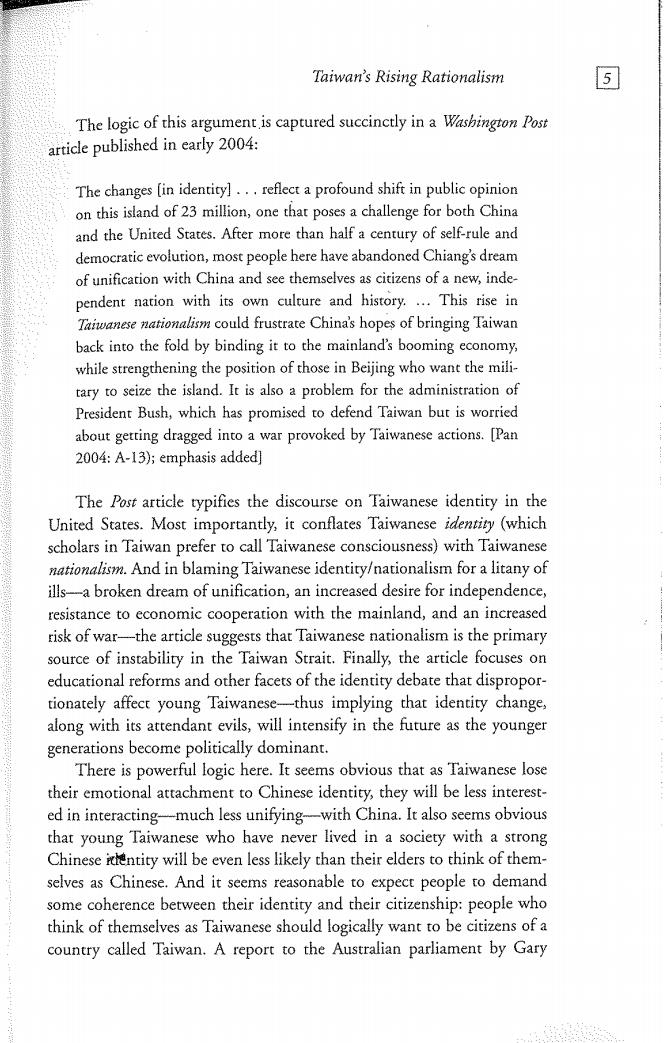
Taiwan's Rising Rationalism E The logic of this argument is captured succinctly in a Washington Post article published in early 2004: The changes (in identity]...reflect a profound shift in public opinion on this island of 23 million,one that poses a challenge for both China and the United States.After more than half a century of self-rule and democratic evolution,most people here have abandoned Chiang's dream of unification with China and see themselves as citizens of a new,inde- pendent nation with its own culture and history....This rise in Taiwanese nationlism could frustrate China's hopes of bringing Taiwan back into the fold by binding it to the mainland's booming economy, while strengthening the position of those in Beijing who want the mili- tary to seize the island.It is also a problem for the administration of President Bush,which has promised to defend Taiwan but is worried about getting dragged into a war provoked by Taiwanese actions.[Pan 2004:A-13);emphasis added] The Post article typifies the discourse on Taiwanese identity in the United States.Most importantly,it conflates Taiwanese identity (which scholars in Taiwan prefer to call Taiwanese consciousness)with Taiwanese mationlism.And in blaming Taiwanese identity/nationalism for a litany of ills-a broken dream of unification,an increased desire for independence, resistance to economic cooperation with the mainland,and an increased risk of war-the article suggests that Taiwanese nationalism is the primary source of instability in the Taiwan Strait.Finally,the article focuses on educational reforms and other facets of the identity debate that dispropor- tionately affect young Taiwanese-thus implying that identity change, along with its attendant evils,will intensify in the future as the younger generations become politically dominant. There is powerful logic here.It seems obvious that as Taiwanese lose their emotional attachment to Chinese identity,they will be less interest- ed in interacting-much less unifying-with China.It also seems obvious that young Taiwanese who have never lived in a society with a strong Chinese icentity will be even less likely than their elders to think of them- selves as Chinese.And it seems reasonable to expect people to demand some coherence between their identity and their citizenship:people who think of themselves as Taiwanese should logically want to be citizens of a country called Taiwan.A report to the Australian parliament by Gary
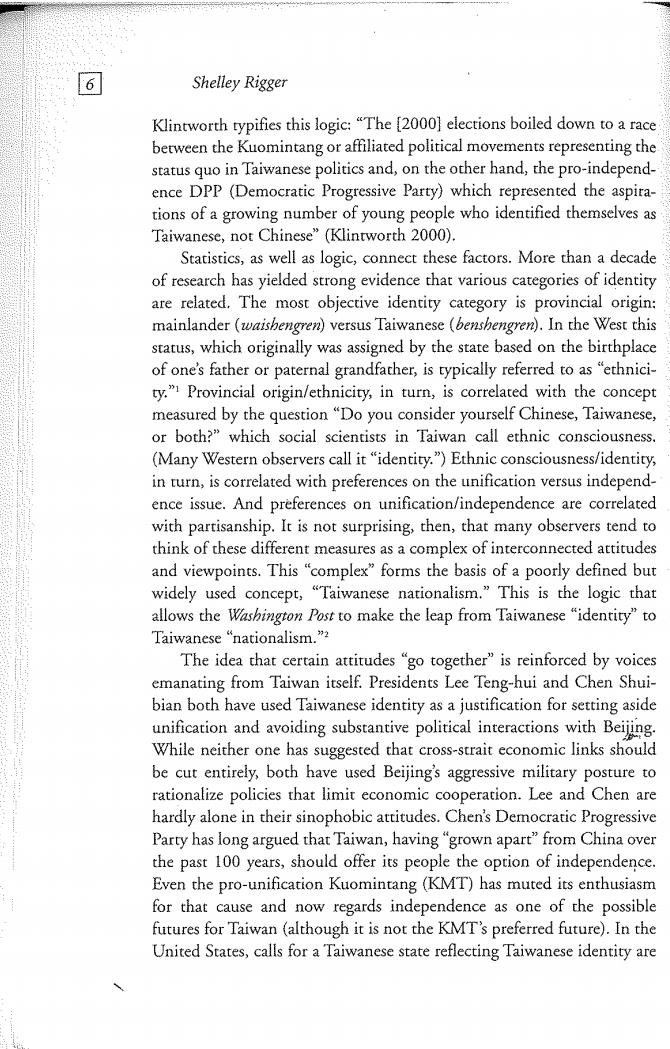
6 Shelley Rigger Klintworth typifies this logic:"The [2000]elections boiled down to a race between the Kuomintang or affiliated political movements representing the status quo in Taiwanese politics and,on the other hand,the pro-independ- ence DPP (Democratic Progressive Party)which represented the aspira- tions of a growing number of young people who identified themselves as Taiwanese,not Chinese"(Klintworth 2000). Statistics,as well as logic,connect these factors.More than a decade of research has yielded strong evidence that various categories of identity are related.The most objective identity category is provincial origin: mainlander (waishengren)versus Taiwanese(benshengren).In the West this status,which originally was assigned by the state based on the birthplace of one's father or paternal grandfather,is typically referred to as"ethnici- ty.Provincial origin/ethnicity,in turn,is correlated with the concept measured by the question "Do you consider yourself Chinese,Taiwanese, or both?"which social scientists in Taiwan call ethnic consciousness. (Many Western observers call it"identity.")Ethnic consciousness/identity, in turn,is correlated with preferences on the unification versus independ- ence issue.And preferences on unification/independence are correlated with partisanship.It is not surprising,then,that many observers tend to think of these different measures as a complex of interconnected attitudes and viewpoints.This"complex"forms the basis of a poorly defined but widely used concept,"Taiwanese nationalism."This is the logic that allows the Washington Post to make the leap from Taiwanese "identity"to Taiwanese"nationalism."2 The idea that certain attitudes"go together"is reinforced by voices emanating from Taiwan itself.Presidents Lee Teng-hui and Chen Shui- bian both have used Taiwanese identity as a justification for setting aside unification and avoiding substantive political interactions with Beijing. While neither one has suggested that cross-strait economic links should be cut entirely,both have used Beijing's aggressive military posture to rationalize policies that limit economic cooperation.Lee and Chen are hardly alone in their sinophobic attitudes.Chen's Democratic Progressive Party has long argued that Taiwan,having"grown apart"from China over the past 100 years,should offer its people the option of independence. Even the pro-unification Kuomintang(KMT)has muted its enthusiasm for that cause and now regards independence as one of the possible futures for Taiwan(although it is not the KMT's preferred future).In the United States,calls for a Taiwanese state reflecting Taiwanese identity are
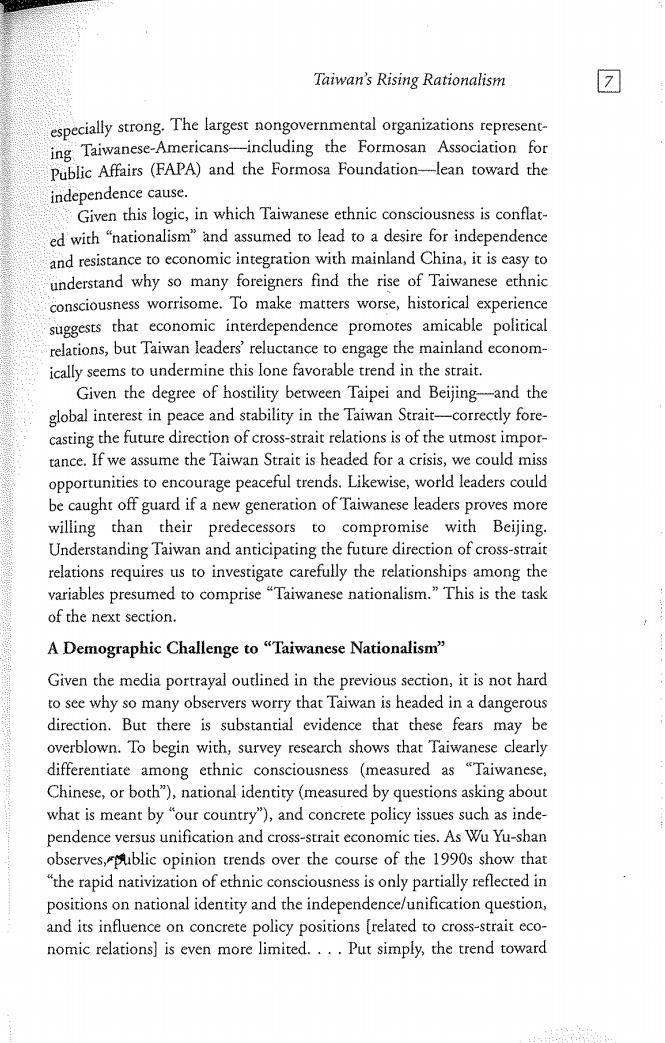
Taiwan's Rising Rationalism 包 especially strong The largest nongovernmental organizations represent ing Taiwanese-Americans-including the Formosan Association for Public Affairs(FAPA)and the Formosa Foundation-lean toward the independence cause. Given this logic,in which Taiwanese ethnic consciousness is conflat- ed with"nationalism"and assumed to lead to a desire for independence and resistance to economic integration with mainland China,it is easy to understand why so many foreigners find the rise of Taiwanese ethnic consciousness worrisome.To make matters worse,historical experience suggests that economic interdependence promotes amicable political relations,but Taiwan leaders'reluctance to engage the mainland econom- ically seems to undermine this lone favorable trend in the strait. Given the degree of hostility between Taipei and Beijing-and the global interest in peace and stability in the Taiwan Strait-correctly fore- casting the future direction of cross-strait relations is of the utmost impor- tance.If we assume the Taiwan Strait is headed for a crisis,we could miss opportunities to encourage peaceful trends.Likewise,world leaders could be caught off guard if a new generation of Taiwanese leaders proves more willing than their predecessors to compromise with Beijing. Understanding Taiwan and anticipating the future direction of cross-strait relations requires us to investigate carefully the relationships among the variables presumed to comprise "Taiwanese nationalism."This is the task of the next section. A Demographic Challenge to"Taiwanese Nationalism" Given the media portrayal outlined in the previous section,it is not hard to see why so many observers worry that Taiwan is headed in a dangerous direction.But there is substantial evidence that these fears may be overblown.To begin with,survey research shows that Taiwanese clearly differentiate among ethnic consciousness (measured as "Taiwanese, Chinese,or both"),national identity (measured by questions asking about what is meant by"our country"),and concrete policy issues such as inde- pendence versus unification and cross-strait economic ties.As Wu Yu-shan observes,public opinion trends over the course of the 1990s show that "the rapid nativization of ethnic consciousness is only partially reflected in positions on national identity and the independence/unification question, and its influence on concrete policy positions [related to cross-strait eco- nomic relations]is even more limited....Put simply,the trend toward
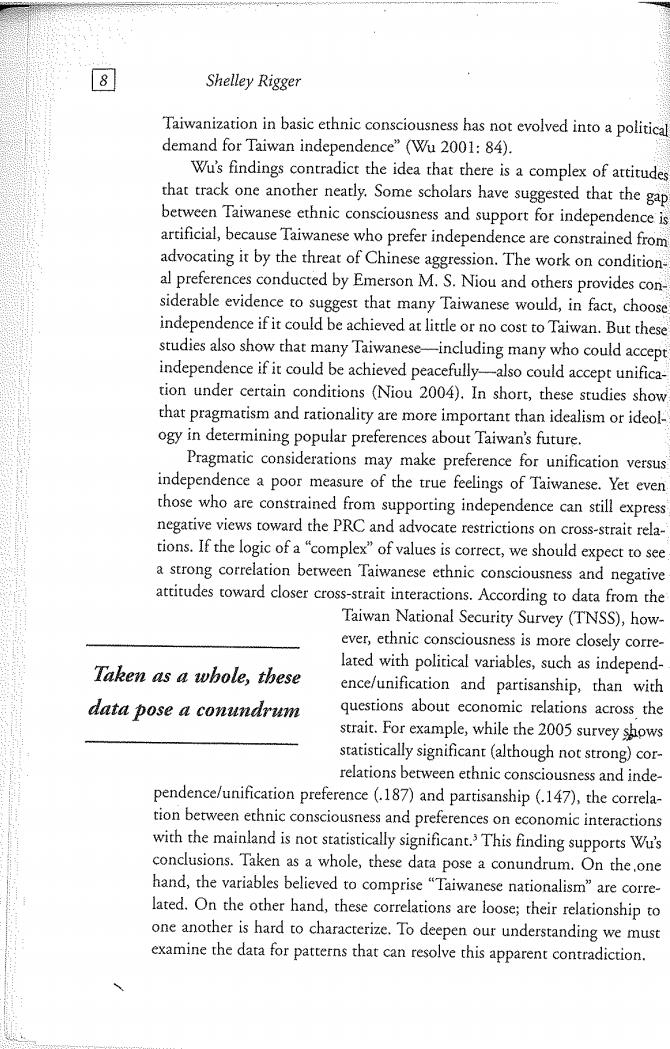
8 Shelley Rigger Taiwanization in basic ethnic consciousness has not evolved into a political demand for Taiwan independence"(Wu 2001:84). Wu's findings contradict the idea that there is a complex of attitudes that track one another neatly.Some scholars have suggested that the gap between Taiwanese ethnic consciousness and support for independence is artificial,because Taiwanese who prefer independence are constrained from advocating it by the threat of Chinese aggression.The work on condition al preferences conducted by Emerson M.S.Niou and others provides con- siderable evidence to suggest that many Taiwanese would,in fact,choose independence if it could be achieved at little or no cost to Taiwan.But these studies also show that many Taiwanese-including many who could accept independence if it could be achieved peacefully-also could accept unifica- tion under certain conditions (Niou 2004).In short,these studies show that pragmatism and rationality are more important than idealism or ideol- ogy in determining popular preferences about Taiwan's future. Pragmatic considerations may make preference for unification versus independence a poor measure of the true feelings of Taiwanese.Yet even those who are constrained from supporting independence can still express negative views toward the PRC and advocate restrictions on cross-strait rela- tions.If the logic of a"complex"of values is correct,we should expect to see a strong correlation between Taiwanese ethnic consciousness and negative attitudes toward closer cross-strait interactions.According to data from the Taiwan National Security Survey(TNSS),how- ever,ethnic consciousness is more closely corre- Taken as a whole,these lated with political variables,such as independ- ence/unification and partisanship,than with data pose a conundrum questions about economic relations across the strait.For example,while the 2005 survey shows statistically significant(although not strong)cor- relations between ethnic consciousness and inde- pendence/unification preference(.187)and partisanship (.147),the correla- tion between echnic consciousness and preferences on economic interactions with the mainland is not statistically significant.This finding supports Wu's conclusions.Taken as a whole,these data pose a conundrum.On the.one hand,the variables believed to comprise"Taiwanese nationalism"are corre- lated.On the other hand,these correlations are loose;their relationship to one another is hard to characterize.To deepen our understanding we must examine the data for patterns that can resolve this apparent contradiction
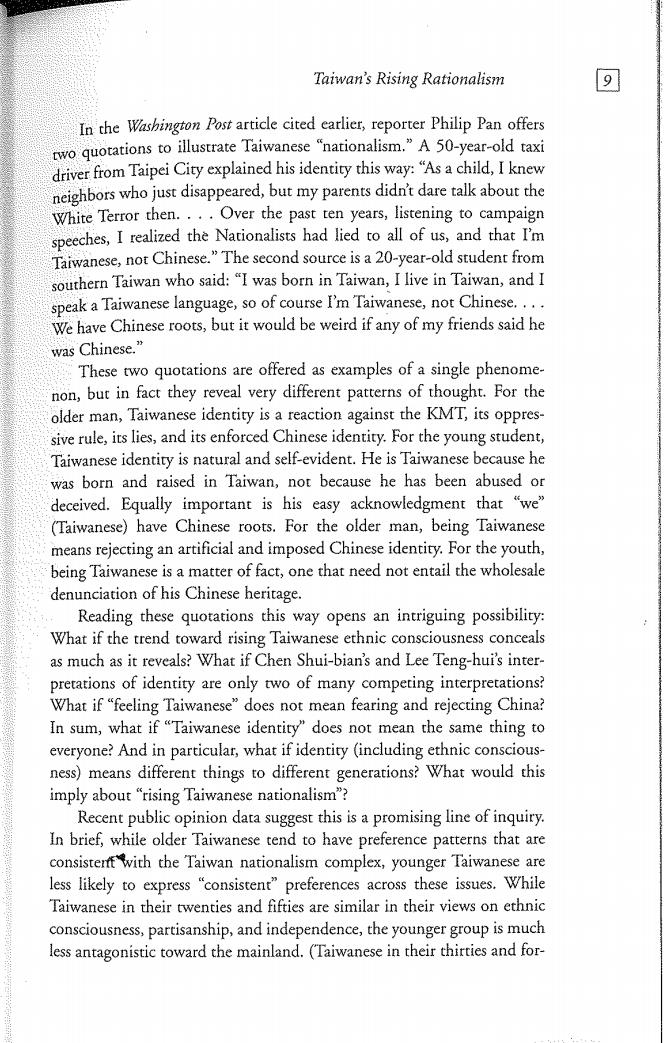
Taiwan's Rising Rationalism 9 In the Washington Post article cited earlier,reporter Philip Pan offers wo quotations toillustrate Taiwaneseationalism."A50-yearold tax driver from Taipei City explained his identity this way:As achild,I knew neighbors who just disappeared,but my parents didn't dare talk about the White Terror then...Over the past ten years,listening to campaign speeches,I realied the Nationalists had lied to all of us,and that I' Taiwanese,not Chinese."The second source is a 20-year-old student from southern Taiwan who said:"I was born in Taiwan,I live in Taiwan,and I speak a Taiwanese language,so of course I'm Taiwanese,not Chinese.. We have Chinese roots,but it would be weird if any of my friends said he was Chinese..” These two quotations are offered as examples of a single phenome- non,but in fact they reveal very different patterns of thought.For the older man,Taiwanese identity is a reaction against the KMT,its oppres- sive rule,its lies,and its enforced Chinese identity.For the young student, Taiwanese identity is natural and self-evident.He is Taiwanese because he was born and raised in Taiwan,not because he has been abused or deceived.Equally important is his easy acknowledgment that "we" (Taiwanese)have Chinese roots.For the older man,being Taiwanese means rejecting an artificial and imposed Chinese identity.For the youth, being Taiwanese is a matter of fact,one that need not entail the wholesale denunciation of his Chinese heritage. Reading these quotations this way opens an intriguing possibility: What if the trend toward rising Taiwanese ethnic consciousness conceals as much as it reveals?What if Chen Shui-bian's and Lee Teng-hui's inter- pretations of identity are only two of many competing interpretations? What if "feeling Taiwanese"does not mean fearing and rejecting China? In sum,what if "Taiwanese identity"does not mean the same thing to everyone?And in particular,what if identity(including ethnic conscious- ness)means different things to different generations?What would this imply about"rising Taiwanese nationalism? Recent public opinion data suggest this is a promising line of inquiry. In brief,while older Taiwanese tend to have preference patterns that are consistertt with the Taiwan nationalism complex,younger Taiwanese are less likely to express"consistent"preferences across these issues.While Taiwanese in their twenties and fifties are similar in their views on ethnic consciousness,partisanship,and independence,the younger group is much less antagonistic toward the mainland.(Taiwanese in their thirties and for-